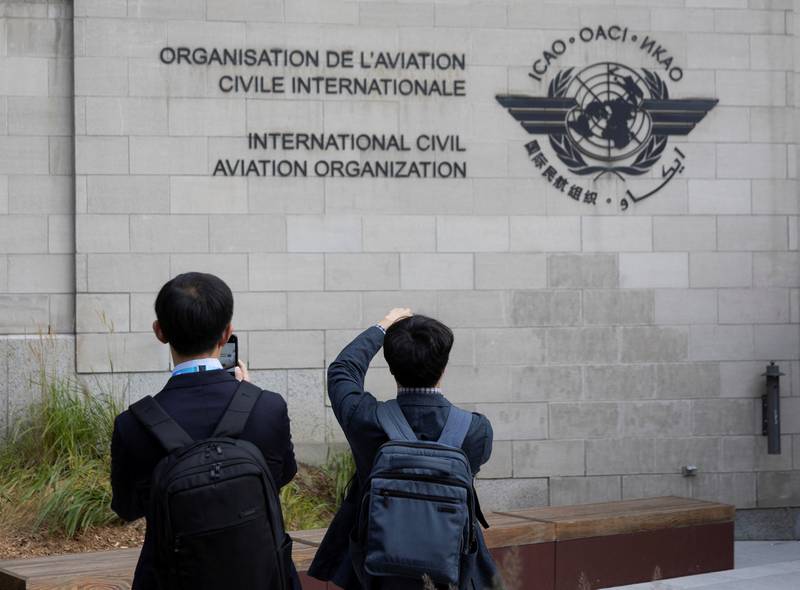Members of the International Civil Aviation Organisation (Icao) have agreed to set the year 2050 as their target to achieve net zero carbon emissions for air travel, in a milestone agreement that starts the clock on the industry.
 The International Civil Aviation Organisation headquarters in Montreal, Quebec. The aviation body said the long-term aspirational goals agreed upon will hinge on the combined effects of a number of emission reduction measures. Reuters
The International Civil Aviation Organisation headquarters in Montreal, Quebec. The aviation body said the long-term aspirational goals agreed upon will hinge on the combined effects of a number of emission reduction measures. Reuters
The adoption of the long-term aspirational goal at Icao's 41st assembly in Montreal will be crucial in the global push to achieve climate change and environmental goals, but will require co-ordination on viable financing and investment support, the 193-member UN agency said.
Achieving the goal will hinge on the combined effects of a number emission reduction measures, including the accelerated adoption of new aircraft technologies, streamlined flight operations and the increased production and deployment of sustainable aviation fuels, it added.
“States’ adoption of this new long-term goal for decarbonised air transport will contribute importantly to the green innovation and implementation momentum which must be accelerated over the coming decades to ultimately achieve emissions free powered flight,” Salvatore Sciacchitano, president of the Icao Council, said.
Icao secretary general Juan Carlos Salazar praised the results of the summit.
“Countries have achieved some tremendous and very important diplomatic progress at this event, and on topics of crucial importance to the future sustainability of our planet and the air transport system which serves and connects its populations,” he said.
The aviation industry is currently responsible for 2.5 per cent to 3 per cent of carbon dioxide emissions worldwide, and the switch to renewable fuels is proving challenging, even though the industry and energy companies are seeking progress.
Airlines have said enormous investments — estimated at about $1.55 trillion between 2021 and 2050 — are needed to fully rid the aviation sector of carbon emissions.
The International Air Transport Association (Iata) described the long-term aspiration goal as the "top achievement" of the Montreal summit, and its significance cannot be underestimated, its director general Willie Walsh said.
“The aviation industry’s commitment to achieve net zero carbon dioxide emissions by 2050 requires supportive government policies," he said.
"Now that governments and industry are both focused on net zero by 2050, we expect much stronger policy initiatives in key areas of decarbonisation."
Among those areas, Mr Walsh said, are issues such as promoting innovation and growth in the production of sustainable fuels, which Iata believes will play the biggest role in decarbonising the aviation sector.
The body estimates that 65 per cent of the mitigation needed for net zero emissions in 2050 will come from these fuels. While the industry purchased all 100 million litres of sustainable aviation fuel available in 2021, the supply remains limited and priced far higher than conventional jet fuel, it added.
While the outcome of Icao's meeting was "an excellent result", four countries — including China, the world's biggest market for air travel — "had expressed reservations", a diplomatic source told AFP.
The outcome of Icao's first general meeting since the coronavirus pandemic is seen to put pressure on world leaders to speed up climate reform, particularly as the gathering is held every three years.
It was also held at a crucial time as it came amid a discord over climate change and the impact of the war in Ukraine.
Other notable environmental developments at the Icao assembly included the completion of the first periodic review of the Carbon Offsetting and Reduction Scheme for International Aviation, or Corsia.
Countries agreed on a new Corsia baseline from 2024 onwards — defined as 85 per cent of carbon dioxide emissions in 2019 — and on revised percentages for the sectoral and individual growth factors to be used for the calculation of offsetting requirements from 2030 and thereafter.
"The global aviation community welcomes this landmark agreement," Luis Felipe de Oliveira, head of Airports Council International, which represents 1,950 airports in 185 countries, said.
"This is a watershed moment in the effort to decarbonise the aviation sector with both governments and industry now heading in the same direction, with a common policy framework."
The airline industry, meanwhile, seeks to rebound from the coronavirus-induced downturn. Passenger numbers last year stood at only half the 4.5 billion in 2019, which was a modest rebound from the 60 per cent annual drop in 2020.
Airlines are expected to narrow their losses in 2022 — from $42bn last year to $9.7bn this year — as air travel demand makes a strong rebound, with a return to profitability expected in 2023, Iata said in June.
